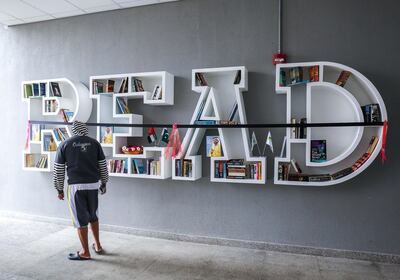"The trusted source of information on access and influence, taste, elegant living and unpretentious fun." No, not my Tinder bio but the way US lifestyle magazine Town & Country describes itself. Who wouldn't want to hear what it has to say? So only a fool would have ignored an interview the magazine ran last month with the fabulously named Thatcher Wine, a "celebrity bibliophile" who curated the bookshelves in Gwyneth Paltrow's Los Angeles home.
Wine explained how he was called in after Paltrow “realised” she needed about “five or six hundred books to complete the shelves”. I wonder when Paltrow realised this and why she hadn’t realised it sooner. It seems quite the oversight. No matter; Wine was on hand. “I looked at books she already owned, which focused on fashion, art, culture, photography and architecture, as well as books that her kids liked,” he said. “We expanded on those topics and for the kids, we included a selection of classics that we thought they might like as they got older.” Job done. Bookshelves filled. LA home complete.
Now, far be it from me to question the wisdom of Town & Country magazine, but I couldn't help feeling a little bit sad after reading the interview with Wine. He claims to like books. He's even written a book called For the Love of Books. But I'm not convinced that he likes reading. It's a strange contradiction, like collecting suitcases but refusing to leave the house.

This is what Wine has to say about curating a library. “First, think about what you are trying to accomplish. Is there a story you are trying to tell? A colour palette you want to achieve? Then think about how that might work within the context of your home and available space. Second, acquire the books.” Notice the order. Wine has managed to relegate books to little more than a decorative feature, useful not for what they have to say but for how they complement the curtains.
To be clear: books are often very beautiful things and deserve to be on display in a home. I was as obsessed as anyone with the recent social media trend of people posting “shelfies”, consisting of photographs of their bookshelves.
Some people arrange their shelves alphabetically, others by colour. I don't agree with A Little Life author Hanya Yanagihara, who said in 2017 that "anyone who arranges their books by colour doesn't truly care what's in the books". It's a bit naff but not quite the same thing as buying books specifically because of their colour. Personally, I prefer the clothes-in-a-heap-on-the-floor approach to my bookshelves, with everything mixed up together. In any case, a house without books feels bereft.
And Wine is quite right when he says that a bookshelf tells a story. But that story is only interesting if it’s true. I can’t believe I’m actually having to write this but owning, say, a Lonely Planet guide to South America is not interesting in and of itself. You can’t simply absorb knowledge or experiences into your home by trucking in “five or six hundred books”. A bookshelf should be a timeline of your life. Wine’s approach to buying books reminds me of the fashion for distressed jeans – popular because they represent an outdoors life hard-lived, a look people want without having to do any of that hard living.
Have I read all the books on my shelves? No, of course not. But each of them was bought to be read, not because of a pretty dust jacket. The aesthetic qualities of a book should be a happy by-product rather than the reason it exists.
Books and bookshelves foster a curious anxiety in people. I suppose I can understand why – on the face of it, a shelf of classics seems more impressive than a shelf of Lee Child or James Patterson thrillers. There is a wonderful photograph in Town & Country of Paltrow's Wine-curated bookshelf, which in one corner includes a set of about a dozen novels that, when stacked together, spell "Russian literature" across the spines. Just in case we were in any doubt that this is a "serious literary home".
But of course, it isn’t actually more impressive to have one type of book over another on your shelves. The books you buy and read should represent who you are. What a shame to deny this in the hope of presenting an alternative impression to your guests. It’s dangerous, too. They’ll only go and ask you what you thought of Turgenev. No idea, you’ll be forced to admit – and to think you could have had a jolly good chat about Jack Reacher.
It’s quite simple: read the books you want to read, put them back on your shelf when you’ve finished and – hey presto – you’ve curated your own library. You really don’t need a gentleman called Thatcher Wine to do that for you.



